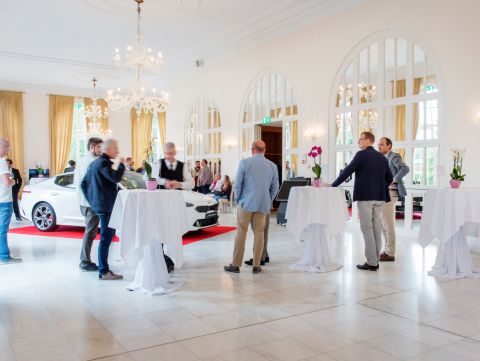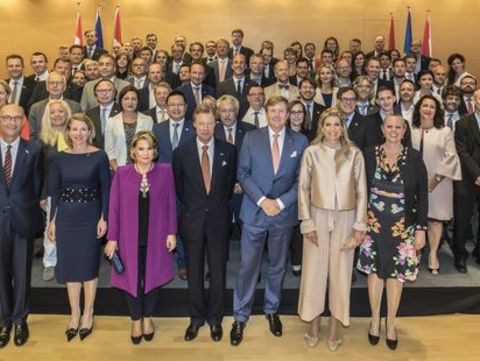Big Pharma in the time of virtual events: adapting and succeeding
The pharmaceutical industry is one of the biggest drivers of conferences and meetings worldwide. As events have now become primarily digital, how is the industry adapting, and what lessons have been learnt?
These questions were addressed in the panel discussion ‘Big and Small Pharma’ that took place on 3 November at the European Convention Center Luxembourg as part of the 59th ICCA Congress 2020, for which Luxembourg served as regional co-host. Moderating the talk was communication consultant Frederik Wittock, who was present in Luxembourg for the congress. Among the fields represented in the discussion were communications consulting, academic research, and a life science association.
Virtual is here to stay – at least for now
Ludo Lauwers, a retired doctor and current Chairman of the Board at Thomas More University College, participated in the discussion from a distance. He emphasised how uncertain the future is, explaining that we have no clear idea how long this pandemic will last or to what extent vaccines will lead to a semblance of normalcy. He believes that online events will continue to be the primacy means of meeting for at least six more months and up to two more years.
Rather than lament the situation, Mr Lauwers is optimistic, saying that this transformation has been percolating for a long time. At least 20 years ago, he says, clinical R&D teams, spread across the world, were engaging in virtual meetings, albeit with rather rudimentary video conferencing platforms. Nowadays, we have state-of-the-art video conference rooms that open up a whole new world of possibilities, he says. However, success is not guaranteed, and organisers need to create the right environment.
Adapt to the medium
Siegfried Marynissen, Founder and Owner of Marynissen & Associates, joined virtually. He discussed the advantages of virtual meetings. For one, they’re not bound by geographical limitations, and size is not nearly as much of a factor in planning and budgeting. However, clients have the same needs and expectations as before, he says, and herein lies the challenge: how to permit associations to train, update, inform, engage, and inspire, just as they did before. For his company, this means spending more time on the technical production side, even going so far as to build a studio suited to virtual presentations.
With determination and a little luck comes success
Willem Dhooge, General Manager of Flanders.bio, whose members come from the life sciences, talked about Knowledge for Growth, a very important event for his organisation and one which has grown into one of the largest life science conferences in Europe. As he and his organisation were in the middle of planning this year’s event, Covid struck. At first, they decided to postpone the conference, but then they opted to make it fully virtual. The main challenge, he says, was to keep the essential parts of the conference: plenary lectures, breakout sessions, workshops, and informal networking. Also, they kept in mind their overarching goals, which is to provide attendees with new insights and knowledge, stimulate partnering, exhibit expertise, and create international visibility.
To make this work, they decided to ‘keep things lean’, he says, because attention spans are short, especially in an online world. They opted for sessions that were high-quality and short. They also made sure to carefully screen technical providers, knowing that glitches and bad connections can ruin an event. They also worked to keep those who’d already signed up – while trying to attract new participants with lower prices. With all these efforts, they hoped to keep at least half of their sponsors and host at least 300 participants, which would allow them to break even. In the end, they attracted more than 700 delegates and 300 companies, providing ample visibility for everyone and fostering plenty of valuable networking – an overwhelmingly positive experience, he says.
Finding inspiration in other industries
Theodoros Yfantis, Account Executive at Porter Novelli, also joined the meeting from a distance. He says that the magic platform that will revolutionise virtual events – what the iPhone did to cell phones, to use his example – hasn’t been invented. While apps like Zoom and Teams work, he says they leave much to be desired. Also, too many organisers try to replicate physical events or opt for a lecture-style event, which means that one participant is framed on an otherwise blank screen while other participants are expected to faithfully pay attention – which is very unlikely, he says, given the plethora of distractions available.
Mr Yfantis says that rather than look back at physical events as models to help us organise virtual ones, we should look to another industry, namely gaming. Video game events have been combining physical and virtual participation for years, he says, and they inherently put the participant at the center. They keep people engaged and, even outside of the games themselves, they’re exciting. Big Pharma can look to this sector and learn a lot, he says.
Key points
- The pharmaceutical industry can still organise events, both large and small, that serve the same purposes as live events used to as long as organisers are prepared to adapt.
- Despite fears of a loss of membership or a drop in revenue from events, associations can and do continue to thrive.
- We should discard the practice of basing virtual events on physical events. To succeed in this new era, we need to look to other industries that have perfected the art of hybrid events, such as gaming.





